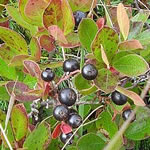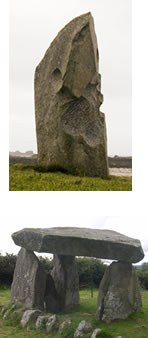– asticoter = to wind up (annoy, provoke) = pryfocio, cythruddo
– fermer = to wind up (a company) = dirwyn i ben
– faire marcher qn = to pull sb’s leg (tease) = tynnu coes rhywun
– la (future/jeune) mariée = bride = priodferch
– le marié = (bride)groom = priodfab
– se casser le col du fémur = to break one’s hip = torri clun
– directeur (-trice) = warden (institution) = warden
– contractuel (le) = traffic warden = warden traffig
– barboter / faire trempette = to paddle (in water) = padlo / rhodli
– pagayer = to paddle (boat/canoe) = padlo
– (faire la) nage du chien = (to do the) doggy paddle = padlo ci
Month: August 2012
My huckleberry friend

The phrase, my huckleberry friend, appears in one of the songs I’m learning at moment – Moon River. At a choir rehearsal last night one of the sopranos said that the word huckleberry means ‘a person who is right for a job’. I’d come across the word before but had never thought what it might mean.
According to World Wide Words the phrase ‘I’m your huckleberry’ means that you are “just the right person for a given job, or a willing executor of some commission.”
Huckleberries are small, dark, sweet berries of plants in the family Ericaceae, in two closely related genera: Vaccinium and Gaylussacia [source]. They were originally called hurtleberries, a dialect word for bilberry, which they resembled, by settlers in the Americas, and this word later became huckleberry. By the early 19th century the word huckleberry was associated with things humble and minor, and tiny amounts. This association was used by Mark Twain for his character Huckleberry Finn – a boy “of lower extraction or degree” than Tom Sawyer.
In the 1830s people started to metaphorically compare huckleberries and persimmons, which are much larger, to describe things that are somewhat beyond one’s reach or abilities. Somehow the word huckleberry also became associated with helpers and assistants, and also with insignificant and nice people.
According to the Online Etymology Dictionary, the word huckleberry is probably an alteration of the Middle English hurtilbery (whortleberry), from the Old English horte (whortleberry). The OED says that whortleberry (/ˈhwɜːt(ə)lbɛrɪ/) is a South-western (England) dialect form of hurtleberry, which is derived from the word hurt (bilberry), which possibly comes from the French heraldic term heurt(e) (small Azure balls) or from the French word heurt (mark left by a blow).
Gaelic

While I was in Scotland last week I took part in conversation circles in the evenings after class. Among those attending there were some whose Scottish Gaelic was very fluent, others who struggled to put sentences together, and people like me who are somewhere in between. I could understand almost everything people said and could contribute to the conversation, though tended to make mistakes and mix in bits of Irish when I didn’t know the Scottish Gaelic equivalents. Fortunately this wasn’t a problem as some people there spoke Irish and provided corrections where nessecary.
I’ve never done classes in Scottish Gaelic, but have been learning bits and pieces for many years, and listening to Gaelic radio programmes regularly. I rarely have opportunities to speak the language, so it was very helpful to take part in the conversation circles, and especially to listen to the fluent speakers. When I had conversations with less fluent speakers they were fairly short and simple, and they tended to switch to English after a while. With fluent speakers conversations tended to be much longer and more complex, and they stuck to Gaelic almost all the time, which really encouraged me to do the same.
While my Scottish Gaelic still needs quite a bit of work, I feel a lot more confident about speaking it now and will see about arranging Gaelic conversations on Skype, and to writing more stuff in Gaelic on my other blog.
One thing I still find difficult is understanding the words of songs. If I really concentrate I can understand some of the words, but I have to hear a song many times in order to understand more. It also helps to see the written lyrics. It’s simliar for songs in other languages, especially if the singers slur the words together.
Can you understand songs in languages you’re learning? Do you understand them the first time you hear them, or do you need to hear them many times.
Language quiz
Here’s a recording in a mystery language.
Can you identify the language, and do you know where it’s spoken?
Cuddies
An interesting Scots word I came across this week was cuddy which means coalfish or donkey and featured in the English translation of a Gaelic song. From the context I knew it was some kind of creature, but which one I wasn’t sure.
According to the Scots Language Centre website cuddy is a Scots word meaning donkey, a foolish person, a saw horse or a vaulting horse. A Scotch cuddy is a pedlar.
Another word that came up that was new to me was gaberlunzie /ɡæbərˈlʌnji/, an old Scots word for a licensed beggar who would seek fees to pray for the souls of other people [source].
Have you come across these words before?
Scottish adventures
I’ve been in Scotland since last Saturday, mainly at Sabhal Mòr Ostaig, the Gaelic college on the Isle of Skye. I’m doing a course in Gaelic mouth music (puirt à beul) and waulking songs (òrain luaidh) with Christine Primrose, and am having a wonderful time.
There are eight of us in the singing class – some from Scotland, some from England, one from Japan and one from Sardinia. The ones from Japan and Sardinia are both professional singers, and earlier today we were treated to some lovely songs from Okinawa, which sound quite similar to Irish traditional songs.
I’ve been speaking quite a bit of Scottish Gaelic, and find that I can now understand most of what I hear in Gaelic and have relatively complex conversations – so my Gaelic has improved a lot since I was last here four years ago. When I don’t know how to say something in Scottish Gaelic I try saying it in Irish and it’s usually understood, though not always.
I’ve also spoken some French, German, Czech and Welsh here, and quite a bit of Japanese. My Japanese is very rusty, but it’s starting to come back. It’s great to have opportunities to speak so many languages 🙂
Spòg
I came across the Scottish Gaelic word spòg (foot) in a song I learnt today and it caught my attention because I heard it a couple of weeks ago when I was in Ireland being used to mean foot in English. I thought it might be a Irish word, but didn’t get round to checking.
In Scottish Gaelic spòg /sbɔːg/ means claw, talon, hand, radius, spoke, paw or leg. It is also used for the hands of a clock: spòg an uaireadair.
I can’t find spog in any of the Irish dictionaries I’ve checked, so maybe it’s a word used in Hiberno-English, but which is no longer used in Irish. The usual word for foot in Irish is cos, which also means leg.
Have any of you come across the word spog before?
Language quiz
Here’s a recording in a mystery language.
Can you identify the language, and do you know where it’s spoken?
Menhirs, dolmens and cromlechs

The word menhir come up in discussion yesterday and I posted it on Facebook today along with the the Welsh translation maen hir, which is what I found in this dictionary. This provoked further discussion about whether the two terms mean the same thing. So I thought I’d find out.
A menhir is a standing stone of the kind that Obelix delivers in the Asterix books. According to the Dictionary of Word Origins and the OED, menhir comes from Breton mean-hir (long stone), which is what the Welsh term maen hir means, so it seems that they are the same. The usual Breton word for such standing stones is peulvan, however.
The word dolmen (a prehistoric structure of two or more upright stones surmounted by a horizontal one), comes via French from Breton: the men part means stone, and the dol part either comes from the Breton word tōl (table), a borrowing from the Latin tabula (board, plank), or from the Cornish tol (hole). So dolmen either means ‘stone table’ or ‘stone hole’.
The word dolmen also exists in Welsh, and another word for such structures is cromlech, which exists in Welsh and English and comes from the Welsh words crwm (bent, stooped) and llech (stone), and is related to the Irish word cromleac (‘bent stone’).
Les mots de la semaine
– mégalithe (m) = megalith = megalith / maen mawr
– menhir (m) = standing stone = maen hir
– dolmen (m) = dolmen = dolmen / cromlech
– tombe (f) tombeau (m) = tomb = bedd
– faire dévier de son sujet / distraire / dérouter = to sidetrack = gwrthdynnu / troi o’r neilltu
– s’écarter de son sujet = to get sidetracked
– en liquide = in cash = ym mhres / yn arian parod
– payer comptant = to pay cash = talu drwy/ag arian parod
– petite caisse = petty cash = arian pitw/mân
– argent liquide = ready cash = arian/pres parod
– monnaie (f) = change = newid (?)
– guérir = to cure (illness, problem, habit) = iacháu / gwella
– remède (m) = a cure = iachâd / gwellhad
– agent secret = secret agent = asiant cudd
– sous contrôle = under control = dan rheolaeth
– c’est une honte! = it’s a disgrace! = mae’n waradwydd!
– grange (f) = barn = ysgubor
– injection (f) piqûre (f) = injection = pigiad